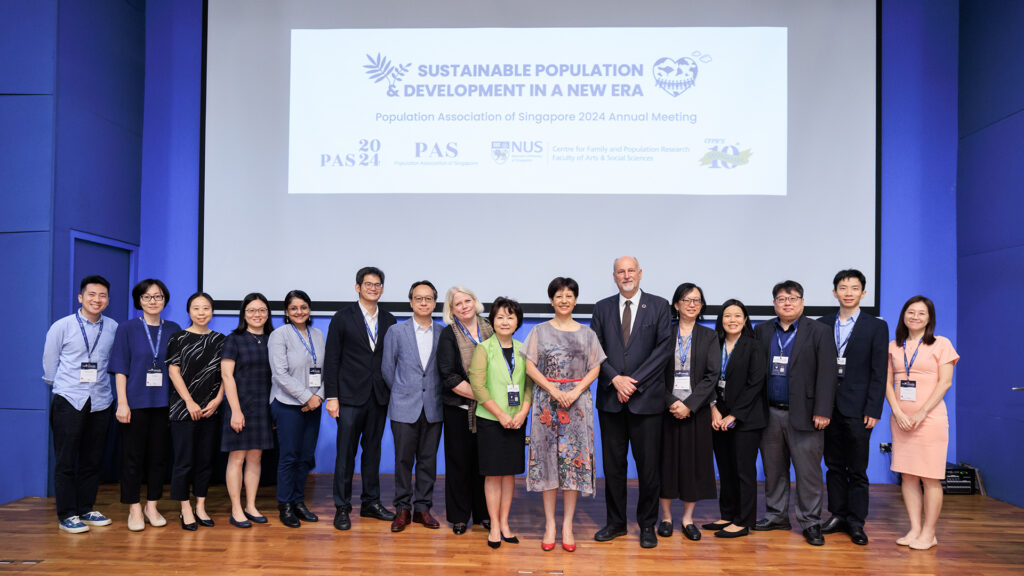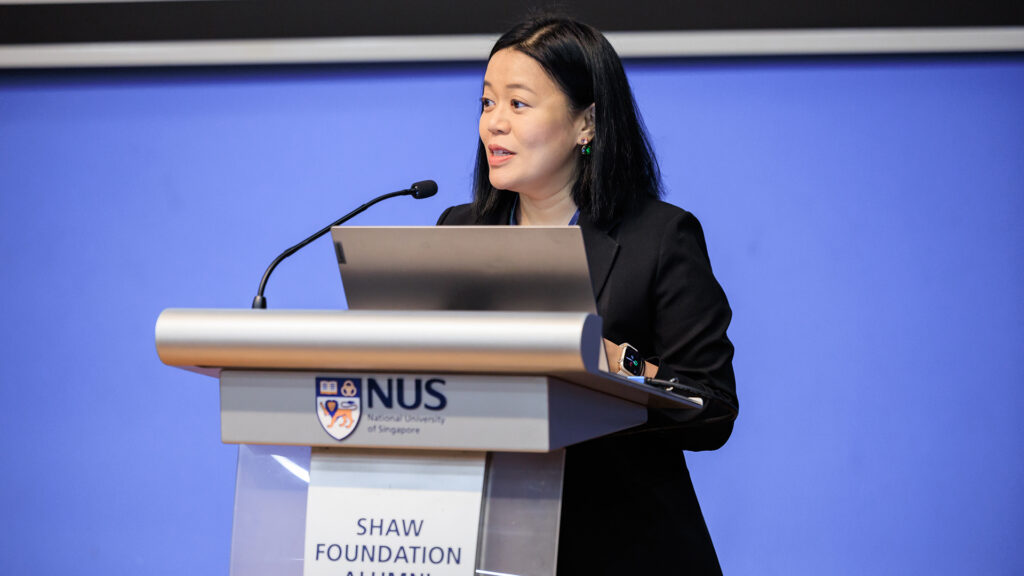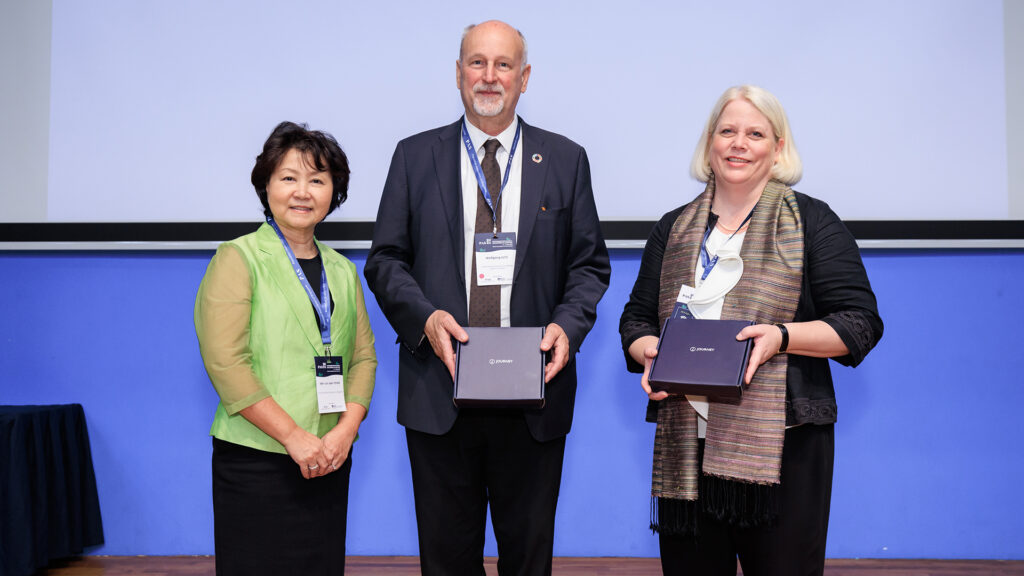Driving Sustainable Population and Development in a New Era
June 5, 2024
IN BRIEF | 10 min read
- The NUS Centre for Family and Population Research (CFPR) leads discussions on trends in population and development against the backdrop of a super-aged world, the persistence of inequalities, as well as the climate crisis and technological revolution.

Seismic shifts in society today, including the rise of technologies such as Artificial Intelligence and robotics, the move towards super-aged societies, increasing migration, and climate change, pose significant challenges to the sustainable development of populations around the world.
The impact of these factors on populations in Singapore, Asia and beyond, was the focus of discussions at the Population Association of Singapore’s (PAS) Annual Meeting on “Sustainable Population and Development in a New Era”, organised by the Centre for Family and Population Research (CFPR) at the NUS Faculty of Arts and Social Sciences and PAS from 16 to 17 May 2024.
Implications for Singapore and the global landscape
In her welcome remarks, CFPR Founding Director and PAS President Professor Jean Yeung, detailed the impact of such big changes on countries around the world.
With super-aged societies now upon us, labour and productivity issues are top strategic concerns. She said, “The growth of social inequalities will impact the young and old alike, shaping opportunities and constraints that affect educational attainment and employment in the former and the ability to age with grace and peace of mind for the older generations.” Added to these, she observed, is accelerated climate change which is calling into question the very sustainability of populations.
Prof Yeung noted that the conference is an opportunity to take stock of developments and “explore opportunities for change in positive directions.”
In her speech as Guest of Honour, Minister in the Prime Minister’s Office Ms Indranee Rajah shared how Singapore is dealing with the twin demographic challenges of a falling fertility rate and a rapidly ageing population. To address these, the government is tapping on new technology and stepping up efforts to enable seniors to continue contributing to Singapore’s shrinking workforce as well as to support them in the area of healthy ageing. The government is also helping Singaporeans to better manage work and caregiving responsibilities by encouraging flexible work arrangements and fostering more family-friendly workplaces.
Stressing the need for collaboration with the academic community to address these issues, she said, “Tackling our population challenges goes beyond the government. It requires a whole-of-society effort with our community and tripartite partners, employers and the wider public. In particular, academics like yourselves, can contribute to the population policy space.”
Minister Indranee cited the CFPR SG LEADS (Singapore Longitudinal Early Development Study) study by Prof Yeung and Dr Li Nanxun on paternity leave, family dynamics and children’s behaviour in Singapore as a prime example of how academic studies are useful to the government as they provide an objective evaluation of the effectiveness of policies, which in turn helps the government strengthen and improve them.
Insightful discussions on challenges faced by Singapore and the region in a new era of sustainable development focused on active ageing
The two-day programme also featured insightful keynote speeches by Prof Wolfgang Lutz, Deputy Director General for Science at the International Institute for Applied Systems Analysis and Founding Director of the Wittgenstein Centre for Demography and Global Human Capital; and Dr Sabine Henning, Chief of the Sustainable Demographic Transition Section, Social Development Division at the United Nations Economic and Social Commission for Asia and the Pacific (UNESCAP). The former spoke about ways to measure sustainable human well-being through a “Years of Good Life” indicator, while the latter outlined the broader challenges and opportunities posed by demographic change in the Asia-Pacific.
Issues such as the future of work and its effect on women and families, the economy and population growth, policies and parenting, as well as the continued impact of COVID-19 on families and society in Singapore were widely discussed.
With many countries in the world, including Singapore, looking for sustainable measures to keep their elderly active and engaged, active ageing was among the most popular topics examined. The papers presented addressed issues such as the role of socio-economic status in shaping the participation and benefits individuals derived from lifelong learning policies and efforts, as well as how personal mastery – defined broadly as being in control of one’s life – can have a positive effect on ageing leading to longer and healthier years.

Continuing on the topic of active ageing, Associate Professor Bussarawan (Puk) Teerawichitchainan from the Department of Sociology and Anthropology at NUS FASS discussed the findings of a recently concluded study on childless ageing in Singapore. The research, which was carried out together with Dr Christine Ho, Associate Professor of Economics from the Singapore Management University, highlighted that those entering their more senior years without children were not necessarily more vulnerable or lonely, as many had built up supportive social networks and remained socially active and engaged with the community.
Findings such as these highlighted the importance of research in shaping policy for healthier, happier and more inclusive societies even amidst population challenges.
Celebrating CFPR’s milestones
The conference also marked the 10th anniversary of CFPR’s founding in 2014.
Over the past decade, CFPR has crossed many milestones and made a significant impact on population research. This includes the development of a capacity-building training programme which has equipped nearly 2,000 local researchers from the governmental and non-governmental sectors with essential tools and expertise in social science research methods. Another is CFPR’s research projects such as the SG LEADS, the LEAP (Lifelong Education for Aging Productively) project on productive ageing among older Singaporeans, and CAST (Childless Aging in Singapore and Thailand) which explores the experiences of middle-aged and older Singaporeans and Thais who age without children.
In sharing this recap of CFPR’s journey so far, Assoc Prof Puk said, “These and other CFPR-led research projects have provided significant insights into the complexities of our societal structures in the areas of family and population.”

This story first appeared in NUSNews on 3 June 2024.

